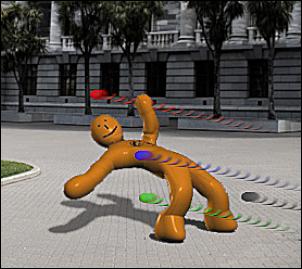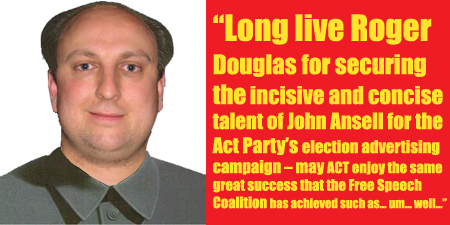Chris Trotter suggests that frequent and heavily-publicised polls favour the right and result in a self-fulfilling prophecy, depressing support for the left. Bomber Bradbury has made similar arguments in the past.
There are two parts to this: first, the question of whether polls are inaccurate vis-a-vis the actual views of the electorate, and if so whether they do in fact favour the right; and second, whether this, on its own, has a substantive impact on actual real-world support.

I am aware of no robust research on this topic in the NZ context (which isn’t to say that it doesn’t exist; although if it did I’d expect the many proponents of this line of argument to be citing it all day long.) So to kick off, let me concede that if there was a significant ideological bias to the polls it certainly could have an impact on voter behaviour. But I suspect any impact would be more complicated than the simple “low showing for a party causes low turnout and/or low support” reading of the “spiral of silence” model Chris cites (which is nevertheless a useful model). For one thing, it’s not clear that the impact is very strong in case of a secret ballot; also, the argument doesn’t take into account New Zealanders’ oft-cited peeriness about single-party majority governments in the wake of Muldoon, Lange and Bolger which could have a moderating effect, and it doesn’t take into consideration the usual “narrowing” that occurs in the latter stages of an election campaign as wavering voters begin to make up their minds. So I doubt the size of this effect on Labour’s polling at least; any shift should not be large, and certainly not sufficient to change the election outcome. However where NZ First is concerned it’s different — a percentage point or two makes all the difference in the world there, and whether NZ First returns to parliament or not rests on the collective spirit of Winston’s faithful. Assuming they still make up fiveish per cent of the voting population they must not waver, and must cast their votes together regardless of what they are told about the polls. If they fail to do so NZ First is out, and all those votes are wasted, and that is certainly an outcome that could result from widespread reporting of polls that show NZ First under the threshold (and one that could change the election outcome).
Note, however, that all that is contingent on those polls showing NZ First to be under the threshold actually being wrong. I’m not persuaded of this, and I’m also dubious about the contention that polls favour the right. As Bomber is fond of pointing out, the polls run in the leadup to the Auckland Supercity election favoured John Banks, while in the election Len Brown won handsomely. That’s important to remember, but it’s only one data point so I’m hesitant to draw meaningful conclusions from it, and if it’s evidence of anything, it’s against the simple reading of the “Spiral of Silence” thesis, according to which Brown’s demoralised supporters should have stayed home.
There is also some evidence out of the US to suggest that landline-only polls favour the Republican party over the Democrats (when compared to polling samples that include cellphones). It’s not clear is that this trend is also in effect in New Zealand. Based on no data, I think it has some influence, but our situation here differs in important ways; most notably, we have more than two parties so variance of this sort is more dilute and less zero-sum. And the likely effect would be ambivalent — if landline-only polls tend to exclude the young and the poor and tech-savvy urban liberals, they should overstate support for NZ First, not understate it.
The matter of bias isn’t readily testable because, as an Australian poll analyst put it recently when looking at bias between pollsters in that market, “we just don’t have elections every week to determine the true state of public opinion“.* There is also evidence to suggest that people’s voting behaviour differs in important ways from how they answer opinion polls. So we need to rely on other forms of measurement; proxies being measured against proxies. There are focus-groups, vox pop interviews and 75c text-polls and coffee-bean polls, and the Horizon poll with its radically different weighting system, but I see no firm grounds to believe any of these would be any more reliable than the major phone poll companies. One very strong point in favour of the usual sort of phone-based opinion polling is that it has remained more or less methodologically consistent for a very long time. This gives us extremely large, continuous datasets that we can plot against real-world events including policy releases, major speeches, current events and elections. In this regard they are much like audience/circulation ratings in the media. The utility of these well-established systems isn’t that they have no flaws — they certainly do, and much of the criticism is valid — it’s that they have a reasonably well-known set of flaws that are consistent over time, and we can use the historical record to make inferences about the present day (too few people, I think, are actually doing this, but that’s a different matter). By contrast other systems — Horizon, in particular — are less well-known, and serious questions need to be asked about the quality of their results. They’re worth watching, but they are not as yet a substitute for what we already have.
Returning to the argument. So if the polls systematically favour the right, and if they do so in such a way as doesn’t also favour NZ First’s older, wealthier and more conservative demographic, and if the extent of that bias is significant enough to have a significant zero-sum election night impact despite all the confounding variables of voter behaviour, then Chris might be right.
But that’s a lot of ifs, and a claim as bold as “polling companies and the media steal elections from the left” demands extremely robust evidence to be given credence. I’m open to the argument, but what we have here isn’t evidence, much less the robust kind; it’s supposition, and what’s more it’s supposition derived from partisan loyalty. The argument is unfalsifiable — if the election does deliver a substantial defeat to Labour and NZ First they will take that as proof-positive that they were right all along and the voters were robbed; if it doesn’t no doubt they will cheer those who battled valiantly and overcame the oppressive regime imposed by the forces of evil. In this regard the argument is nearly indistinguishable from that made in 2008 by the Free Speech Coalition who, despite their howls about Stalinist restrictions on political marketing, managed to help their political representatives to a handy win.
My view of Chris and Bomber’s general line of argument is that it’s more of the usual excuse-making and blame-shifting that I see from lefties who can’t bear that their tribe is staring down the barrel of a(nother) heavy defeat. It’s an attempt to make the evil media cabal responsible for poor performance, and to minimise the effect of weak leadership, institutional incompetence, lacklustre campaign and — in Peters’ case — public self-immolation during the last term. It’s a myth; something to keep the faithful warm at night, in the absence of actual victory. Myths certainly have a kernel of essential truth, but they should not be mistaken for evidence. Moreover, as regards Chris’ concerns about the election accurately reflecting voters’ wishes; these would have more credibility if his own history of respecting the solemn integrity of electoral politics was itself less one-eyed. He thunders:
hundreds-of-thousands of New Zealanders will not only be perfectly entitled to say “bugger the pollstersâ€, but they will also be entirely justified in asserting that the election has been stolen from them
This would ring less hollow if, following the 2005 election, he had not so cravenly excused the Labour party’s own admitted breach of electoral law as being “acceptable corruption” inasmuch as it served the greater ideological purpose of preventing National from being elected. Given that history, his complaints about polling and media conduct look like nothing more than an appeal to ideological tribalism with a bright red smear of electoral integrity lipstick on.
And yet, he has a strong point: if NZ First’s share of the party vote on November 26 comes in fractionally below the 5% threshold, democracy will have been poorly served in 2011, as it was in 2008. My personal views of that party aside, as a matter of natural justice anyone commanding a twentieth of the vote should be entitled to roughly a twentieth of the representation in Parliament. But however unsexy it might be, the solution to this isn’t injustice to attack the pollsters or the media. The argument isn’t supported by the evidence; even if it was nobody’s going to change on Chris and Bomber’s say-so, and we all saw what happened to the Clark government’s regulatory overreach. The pragmatic response here is to work towards reducing or removing the electoral threshold so as to ensure that natural justice is served and variance is less likely to simply exclude a party from representation, and to turn back to the process of returning political rigour to the political left by building competence, vision and leadership so it can succeed despite the obstacles before it. Less myth, more reality.
L
* Pollytics’ analysis plots polling companies against each other, measuring each pollster’s bias from the other polling companies. David Winter has had a go at doing something similar for the NZ context, though he has much less data to work with. While interesting, it’s important to reiterate that none of this addresses the concerns about poll accuracy vis-a-vis the electorate.)


 DPF published two posts yesterday about prominent lefties comparing righties to fascists:
DPF published two posts yesterday about prominent lefties comparing righties to fascists: